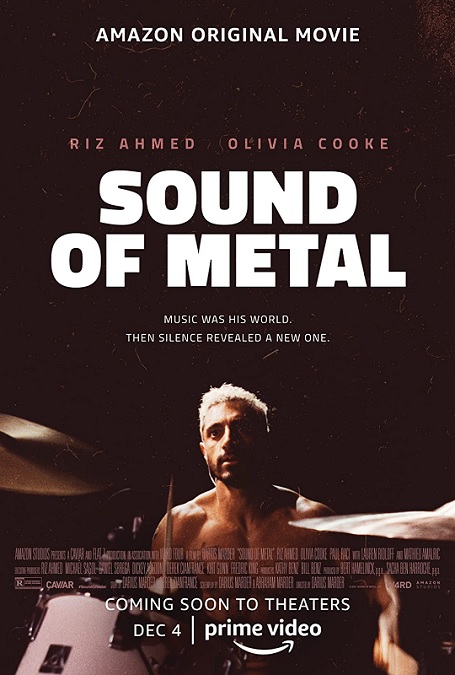




The Sound of Metal – 2020-21
I liked this movie more than I thought I was going to for several very specific reasons. First, I thought it was going to be a movie about a style of music that I’ve never really enjoyed. I was wrong. Second, I liked how it showed me a part of the world that I know very little about. Third, it left me thinking about it for days after I watched it. I found myself wondering about the characters and their motivations. I wanted to know what happened to them after the credits started to roll. That, in itself, is the mark of a good movie, or at least a good ending. And fourth, the two hour movie seemed to be over in no time. It did a great job holding my attention.
Riz Ahmed played the part of Ruben Stone, a drummer in a metal band, who loses his hearing. I have only seen the lead actor in one other film, and honestly, I wasn’t terribly impressed with that performance. But here, he found a role that suited him and I thought he did a great job. His girlfriend and lead singer in the band is Lou, played by Olivia Cooke. The critics all praise Ahmed’s performance, and to be sure, he did a great job, but I think Cooke’s performance was just as good. I found it interesting that to prepare for the role, Ahmed spent two hours a day studying sign language, two hours in drum lessons, and two hours with a personal trainer, and the remainder with his acting coach.
Other notable characters in the film were Paul Raci, playing Joe, the administrator of the deaf community that tries to help Ruben, Lauren Ridloff as Diane, a teacher at the deaf school who teaches Ruben sign language, and Mathieu Amalric, Lou’s father, who welcomes Ruben as the love of his daughter’s life. As you might expect, the entire cast did a fine job, and I have no criticisms there.
At first, as one might expect, Ruben is terrified at the prospect of being deaf, and becomes hyper-focused on a surgery that he thinks will fix all his problems. He shows little interest in accepting or dealing with the change in his life. When Lou takes him to a shelter for addicts who are deaf, he is ready to walk away from it because they will not allow Lou to stay with him. But knowing that it is what Ruben needs, Lou leaves him. That scene affirmed my belief that their relationship was actually a strong one. She loved him enough to let him go, and it was powerful.
But after Joe teaches Ruben to stop resisting the help that was being freely offered, Ruben not only learns to deal with the loss of his hearing, but he makes friends, finds a community to be a part of, and a bit of happiness, as well. He learns to live with the silence. He is even offered a permanent job at the facility. But he never completely abandons the idea of getting the cochlear implant surgery. Going against the rules of the shelter, he sells all his possessions to pay for the expensive procedure. When Joe finds out, Ruben is asked to leave the shelter, which is founded on the belief that being deaf is not a disability that needs to be fixed.
But the surgery doesn’t solve Ruben’s problems. The quality of the hearing he regains is so poor that he becomes disillusioned. He wonders if he has made one of the biggest mistakes of his life. There is a phrase I know of that says that the only way to hurt a man who has lost everything is to give him back something broken. I think it applies to the scenario. The implants do, indeed, restore some of his hearing, but it sounds metallic, tinny, and broken, like a scrambled radio signal. It gave new meaning to the film’s title, which referred to both the sound of the metal music he loved, and the bad metallic sound of the implants.
Next, Ruben learns that Lou has returned to her father’s house in Paris. He goes to be with her, and of course, I was expecting him to find her with another man. But again, my expectations were confounded. She was genuinely happy at his return, and her love for him was just as strong as before. But in the end, though he knows she loves him, he sees how his presence is disrupting her life, and even enabling a certain amount of self-destructive behavior in her, he leaves Lou in order to save her, just like she had done to him earlier in the film. The last scene shows Ruben sitting on a bench listening to the distorted sounds of the city. He deactivates his implants, seeming to prefer the silence that he’d been so afraid of.
The sound design in the film was fascinating. It tried to take the audience into the world of the deaf. The scenes where Ruben was first losing his hearing were particularly well-done. And the metallic sounds of his implants was fascinating to listen to. The film actually won two Oscars at the Academy Awards, one of which was for Best Sound Design. The other was for Best Film Editing. Those are both categories I know very little about, but I suspect they were well-deserved awards.
As the credits started to roll, I found myself wondering where Ruben would go. Would he try to go back to the shelter and ask Joe for forgiveness? Would he continue to use the implants on a regular basis, or had he finally accepted that his deafness was not a handicap, and live his life without depending on them? Would Lou go after Ruben and try to find him, or would she understand why he left, and move on with her own life? As I said, a movie that makes you ask those kinds of questions is a good movie, or at least it has a good ending. This one was both.








